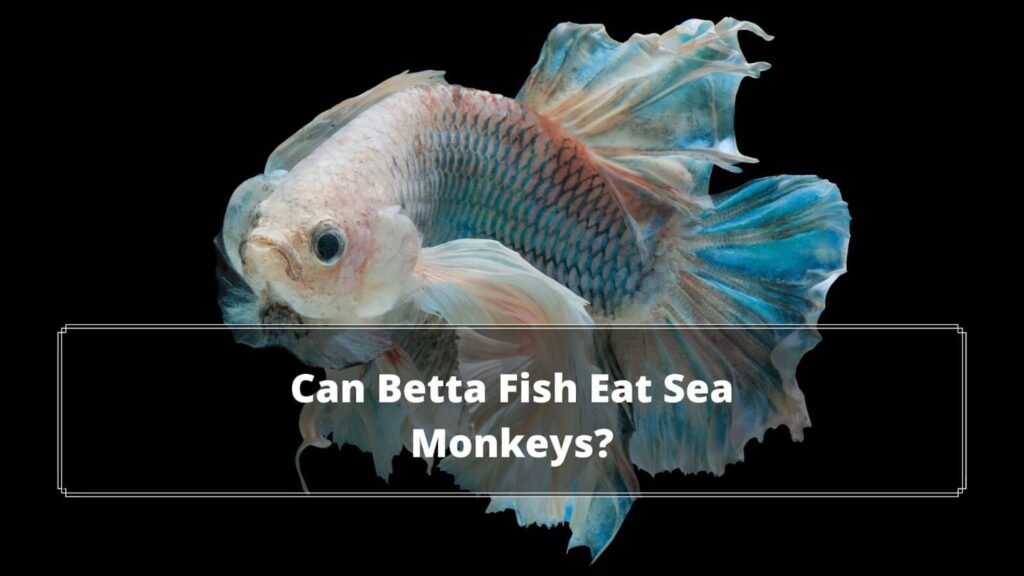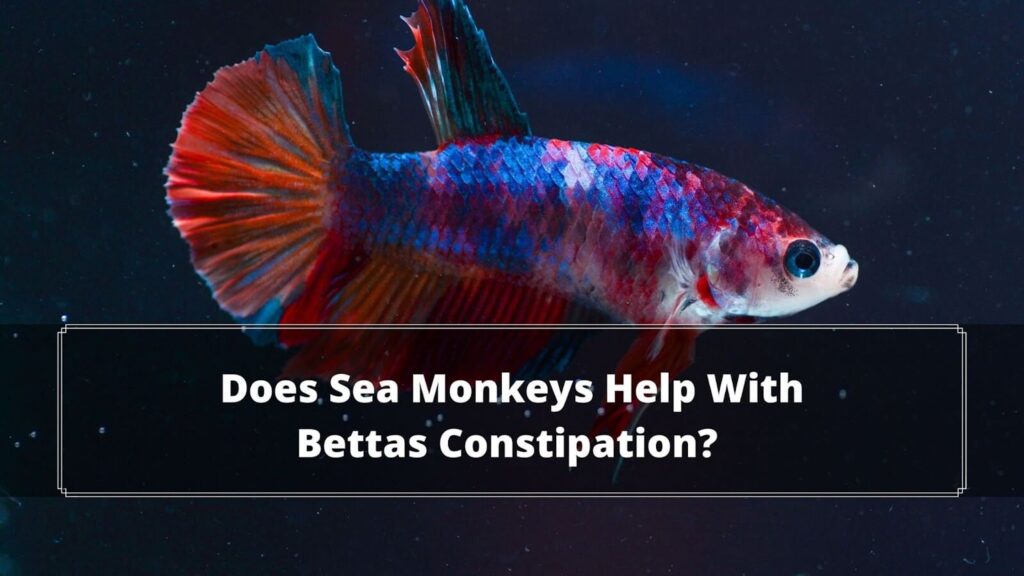Being a proud and responsible owner of a beautiful betta fish, we want to feed the best possible diet to our available fish. It is not only essential to provide the correct diet but also a well-balanced one that helps your fish live a healthy, long, and happy life.
By feeding the best possible diet to your bettas, you will be rewarded by your fish displaying its brightest color. Therefore, if you are wondering: can betta fish eat sea monkeys? Then, this is the article for you.
In this article, we will discuss whether bettas eat sea monkeys, how often, and how to feed them. Keep reading on to find out if betta fish can eat sea monkeys and its egg or not.
Post Contents
Can Betta Fish Eat Sea Monkeys?

Yes, betta fish can eat sea monkeys as it is a perfect food that provides high protein and extreme energy to your fish. However, bettas are prone to digestive problems if fed too much, including bloat and constipation. The smaller species of sea, also known as brine shrimps, are a more ideal and easy-to-digest option compared to more significant sea monkeys.
Monkeys are also brine shrimps, unlike the ones you find easily in nature. Sea monkeys are a hybrid breed produced in 1957 by Harold von Braunhut. He named the species Artemia NYOS.
All brine shrimp, including sea monkeys, fall under chitinous food with high fiber content for bettas. However, it may also act as a laxative. Sea monkeys are okay until you provide a moderate amount to your fish. Consider feeding live sea monkeys while maintaining their healthy diet.
Can You Breed Sea Monkeys On Your Own?
See monkeys, a hybrid species of brine shrimps popularly known as Artemia NYOS. They can grow up to a size of 1/2 inch into even an inch long, making them not suitable for most bettas to eat. However, they are straightforward to breed. You need to purchase a sea monkey kit from your nearby Pet store.
The kit will have a packet of eggs which you need to stir into the preconditioned water. Remember that eggs can hatch instantly, so don’t stir the eggs directly into the aquarium. Breeding the sea monkeys in the betta’s tank will lead to bloating and constipation.
Bettas will have no control while eating the sea monkey’s eggs. Remember that bettas can only eat sea monkeys, not more significant than the space between their eyes. Let’s discuss some guidelines while feeding live sea monkeys to betta fish.
Feeding Live Sea Monkeys To Betta
There are a few guidelines that you need to follow while feeding lives see monkeys to your bettas. Feeding sea monkeys benefits betta’s health problems, like constipation or bloating, but too much of it worsens it. Therefore, knowing when to feed sea monkeys and how much is adequate will be necessary for all betta’s owners.
Can I Feed My Betta Live Sea Monkeys?
Being carnivorous, betta fish can eat sea monkeys. You can feed live sea monkeys without any hassle as long as it is not more significant than the size between the space of your betta’s eyes. Viewing monkeys will trigger your betta’s predatory instinct, not to mention that monkeys are super rich in fiber and protein.
That said, only include sea monkeys sparingly as a supplementary food or treat. Sea monkeys are not suitable as a staple food for bettas.
How To Feed Betta Live Sea Monkeys?
As live sea monkeys need saltwater to survive and may find it difficult to breathe in your betta’s water, you should consider feeding only one or two at a time. It is always advised to use a net to catch sea monkeys, rinse them off and add them to betta’s tank, as per recommendation. Keep the rest back in a disease-free shallow pot containing salt water.
How Often/Much Should I Feed My Betta Fish Live Sea Monkeys?
Since bettas are tinier than most fish, feed live sea monkeys only 1 or 2 times a week. It is best to only include sea monkeys as a supplementary food source and not a staple diet, as it can cause constipation & bloat. I would advise you to judge your betta’s appetite by adding 1 or 2 sea monkeys in the tank at a time to see how he responds.
Does Sea Monkeys Help With Bettas Constipation?

As most brine shrimps are known to be chitinous food containing high fiber content, sea monkeys can also help with constipation if you maintain this diet until your fish recover. However, it may act as a laxative only when fed in moderation. Provide your bettas with live sea monkeys from time to time.
Always remember to feed the monkeys as supplementary food once a week. Providing too much will result in constipation. Thus it can create havoc on your Bettas.
Not only will you need to spend a lot of money for the right supplies and care, but it will also take your bettas longer to grow.
As bettas and aggressive fish are also used to eating their faces, it can lead to a buildup of waste in your fish’s stomach, creating more issues in proper digestion. And it will also make your bettas work hard to absorb water.
Hence, overfeeding sea monkeys will result in bloating and other related health issues that you probably didn’t have before with your betas. If you notice any unusual signs with your bettas, check them out with your local veterinarian.
5 MUST KNOWs Before Feeding Live Sea Monkeys
- If your fish is vomiting or not taking an interest in sea monkeys, you need to get your betta checked out.
- Never feed too much, as overfeeding sea monkeys to betta will always be harmful and cause them to become obese.
- Make sure you don’t have too many bettas in a tank that can lead to an overload of bacteria. Plus, feeding too many bettas at a time with sea monkeys may lead them to bump into Each other while hunting.
- Never let the sea monkeys’ eggs hatch in your betta tank. Bettas are used to eating brine shrimp’s egg capsules. Thus consumption of sea monkeys’ eggs will result in constipation.
- Avoid feeding any sea monkeys that are larger than the space between your betta’s eyes. In addition, only feed sea monkeys one or two times as an additional supplementary food source and nothing else. Feeding sea monkeys as a staple food will lead to bloating, constipation, and other stomach-related problems. If you are bettas, overeat and conduct to become obese.
FAQ
Can I Feed My Betta Sea Monkeys Every Day?
No, sea monkeys are not suitable as a staple diet for bettas. Overfeeding sea monkeys to fish may lead to constipation and bloating. They are ideal as a supplementary food source or treat to bettas, not daily intake. However, you can feed the frozen ones more often, but moderation is essential.
Are Freeze-Dried Sea Monkeys Good For Bettas?
Like live ones, freeze-dried & frozen sea monkeys are also rich in protein. It is suitable as a supplementary food source for bettas. Don’t use sea monkeys as a daily food source for your fish. Also, ensure each sea monkey is less than the size of a betta’s eyeball.
Conclusion
So, betta fish can eat sea monkeys if you don’t overfeed your fish. However, it is best only as a supplementary food source. Consider feeding live sea monkeys you have farmed at home, as they are easy to breed in a separate tank.
That way, you will know your bettas are less likely to be introduced to chemicals, diseases, or parasites. You will breed and grow healthy sea monkeys that will be fed to the fish. Therefore bettas will enjoy a healthy life.
Are you convinced about the benefits of sea monkeys? Hopefully, you will also include them as a part of your betta fish diet. Letting bettas decide if they want to eat would be best. This is why I would recommend you add only one or two live sea monkeys at a time in their tank and observe if they hunt & like it or not.
I hope you like and enjoy our article on bettas eating sea monkeys. Please remember sharing is the care, and your one share will be appreciated and motivational to write more.
Rest assured because, with proper care and a well-balanced diet, your bettas will have a long healthy life in harmony. May god bless your bettas with true bright colors and lay many eggs. See you in the other article, till then take care and goodbye.

94% of pet owners say their animal pal makes them smile more than once a day. In 2007, I realized that I was made for saving Animals. My father is a Vet, and I think every pet deserves one. I started this blog, “InPetCare”, in 2019 with my father to enlighten a wider audience.
